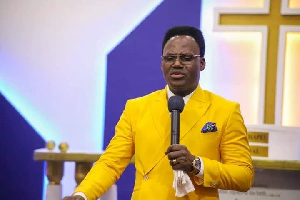This blog is managed by the content creator and not GhanaWeb, its affiliates, or employees. Advertising on this blog requires a minimum of GH₵50 a week. Contact the blog owner with any queries.
Zeqblog Blog of Tuesday, 24 December 2024
Source: Okine Isaac

In a shocking declaration, Prophet Nigel Gaisie, pastor of the Prophetic Hill Chapel in Accra, Ghana, has delivered a prophetic vision about Honourable Kennedy Agyapong, a famous and outspoken figure in Ghanaian politics.
Known for his provocative remarks concerning God’s men, Agyapong’s name was recently revealed by the prophet during an interview at his church.Prophet Gaisie shared what he claimed as a divine vision, stating it contained a serious message for Agyapong. Despite their public disputes, the prophet stated that he felt ethically bound to communicate the warning.”I had a dream about Honourable Kennedy Agyapong, and although he has criticized me in the past, I cannot keep this message to myself,” Apostle Gaisie said. “God is urging me to speak, and I believe it’s vital for him to hear this.”
Kennedy Agyapong was shown in his vision to play a big leadership role in the future. However, Prophet Gaisie warned that this path is laden with danger. He warned Agyapong about spiritual and physical threats, encouraging him to prioritize his health and safety.
“Tell him to be vigilant and mindful of his health and safety,” Prophet Gaisie said. “There are unseen forces working against him, and he must take measures to protect himself.”
Prophet Gaisie, whose previous prophesies have elicited both praise and skepticism, stressed the importance of this warning. He cautioned that ignoring these warnings could imperil the politician’s future.
The prophecy has sparked debate across Ghana, with opinions divided. Some consider it a true divine message, while others dismiss it as speculation. The conflict between Gaisie and Agyapong adds a fascinating layer to this growing story.
As the public debates the prophecy’s authenticity, one issue remains: Will Kennedy Agyapong take this warning seriously, or will it be dismissed as another provocative utterance in Ghana’s dynamic political and religious discourse?


